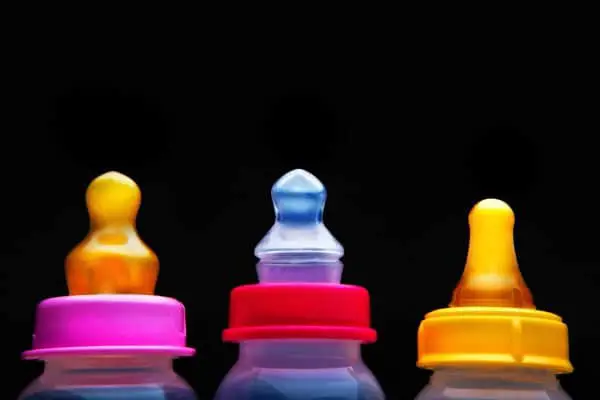How Long Does It Take For Baby To Adjust To Formula Change?
How long does it take for baby to adjust to formula change is one popular question new mothers ask. The other day, I went to visit my friend in Toronto. She had just given birth to her first born and was sticking purely to baby formulas because she had milk supply problem. For the first one month she had relied on the Gerber Good Start Gentle Formula and wanted to switch to another formula since her baby had developed some sort of allergies to the current formula.
As a good mommy friend would do, I told her she could try Similac Sensitive Infant Formula. All my four boys have been on this formula, two are lactose sensitive, one dealt with colic/gas and one had sensitive tummy (at least that’s what our pediatrician said).
A week after returning home, guess what happened? My Toronto friend called, complaining that her new formula was probably causing her baby more harm than good. She told me that her baby would arch her back and would also cry endlessly and tense when feeding. I had to convince her that there’s a grace period- when you should wait for your baby to fully adjust to formula change.
How long does it take for baby to adjust to formula change?
Your baby will adjust to formula change within two to six weeks utmost. So you will have to wait for up to one month and 2 weeks from the day you switched the formula. So you will have to be patient.
My recommended formulas for toddlers:
What you should know before switch formulas
In the first year after your baby is born, you’ll feed him tons of formula, but the big question is; will the formula from same brand?
Formula prices could be prohibitive and this is one of the many reasons mothers change formulas. Other causes of formula change include allergies, illness- when either of these happens, I would advise you to consult your pediatrician. Below are some frequently asked questions regarding formula change.
When should you switch baby formula?
If your little one is allergic to the current baby formula you feed him, it’s time for a switch.
Here are some signs that will show you that your baby is allergic to the current formula. They include scaly, red, dark skin, forceful vomit, and extreme fatigue. These are signs that show that your baby isn’t getting sufficient required nutrients from the current formula because his body is rejecting the baby formula.
You’ll also notice that your baby will cry more often than he used to, is gassy and fussier than usual and has water stool.
Your doc can recommend switching formula for some other reasons. For instance, if your little one needs more iron, your doctor might recommend you to switch to a iron rich formula.
Can you switch formula brands?
Switching formula brands is okay only if it’s a must especially when your baby develops allergies to the current brand. But its always recommended for you to stick with the current formula is your little one is not experiencing illness or allergies.
Here is my honest advice: never switch baby formula just because a new brand in the market is giving our free samples or massive discounts. You could compromise your baby’s health.
You should only change formula brand is the current formula is giving your child allergy or other complications.
If you’re worried that changing formula will affect your baby’s sensitive tummy, well you shouldn’t. This is because there’s always a few weeks period before your baby adjusts to the new formula.
How do I switch to a new formula?
If you’ve fully determined that a formula switch is mandatory, below are some tips to help you get started.
- Get advice from your doctor: it’s always good to get advice from your pediatrician. Your doc is the only person who truly knows what your little ones needs and you will need their guide especially when you have trouble switching formula.
- It’s always recommended to choose a formula with same protein content level as cow’s milk. However, if your infant is lactose intolerant, its best to speak to your pediatrician on the best formula.
- Introduce the formula slowly. While some infants will adjust fine, most protest the change. If your baby protests, I would recommend you to introduce the formula in different stages. For example, you can mix a small amount of the new with the old formula and with time increase the amount of new formula. Soon your little one will adjust.
What to know when changing formula for your child
After changing the formula, its recommended you keep an eye on your little one 24 hours after the change.
Look out for signs such as excessive gas, constipation, diarrhea, clammy skin, limpness and any other unusual behavior. You should also inspect your child’s stool and look for presence of blood which could mean an emergency visit to your ped.
Once you switch your current formula, don’t switch to another unless the doctor instructs you to do so. The more you change the formula, the more likely your baby is going to have more problems.
Final thoughts on formula change
Like earlier stated, your baby will take about 2-6 weeks to adjust to formula change. So the correct answer on how long it takes for a baby to adjust to formula change will depend on your baby. But it’s always recommended that you seek professional advice wherever you might try to change something that relates to the health of your child. You can also read my guide on fans for use on baby stroller, detergents for baby cloth in hard water, and baby wipes calculator.


Baby crys after feeding him and is fussy! What should I try? He uses Enafamil now